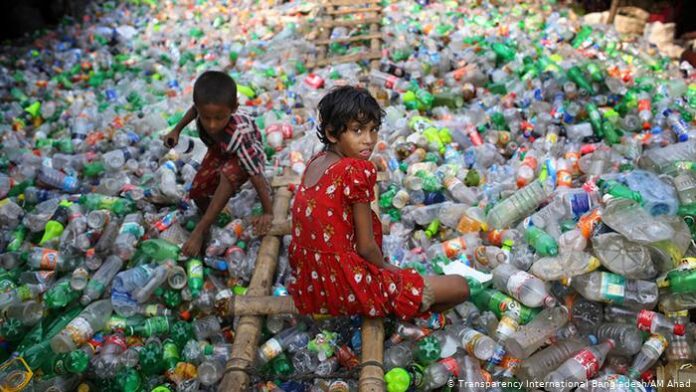Experts have said that embracing circular plastic economy would speedily grow Nigeria’s economy and help regulate and create conducive friendly environment for healthy living.
The reports say that a plastics circular economy is a prosperous economy that recirculates materials, keeping plastics out of the environment and in the economy.
It also harnesses the extraordinary material properties of a wide range of plastics, and captures their full value but without waste or harmful emissions.
Respondents, in their separate interviews in Ibadan, were unanimous in their submissions that adoption of the plastic economy would speedily transform the nation’s economy as well as address the current worrisome plastic pollution across the country.
Recent report says of 2.5 million tonnes of the about 32 million tonnes of wastes per year, being generated in Nigeria, are plastic.
Prof. Titilayo Akinlabi, Director, Pan African University Institute of Life and Earth Sciences, (PAULESI), Nigeria, while explaining the concept of the institution’s Circular Plastic Innovation Hub project, said circular economy simply “means reusing or recycling existing materials for as long as possible.”
“The dream is to have more universities on board, so that collectively we can achieve the goals of a circular plastic economy. We acknowledge and appreciate the British Council for the funding,” Akinlabi said.
She noted that the initiative was different from others because plastic waste would be converted and sent into a 3D printer to print so many things.
“We are applying a circular economy to plastic to proffer sustainable solutions to the plastic menace in the society, through recycling and reusing so as to reduce waste of plastic within the ecosystem.
“It is being driven by major universities and other stakeholders as well. Majorly it is to reduce waste plastic in the community, especially what later ends up in waterways.
“The three universities are University of Lagos, UNILAG, from South West; University of Nigeria, Nsukka, UNN from the East and ABU Zaria from the North.
“We currently have co-investigators from these universities working on this waste to wealth initiative.
“The hub is being sponsored by the British Council and the objective of the circular plastic economy project is to identify and map out relevant stakeholders, institutions and enabling conditions for a thriving circular plastic ecosystem.
“We are also going to have capacity building to train people on methodology to engage and also we want to bring about entrepreneurship in the programme,” Akinlabi said.
She stated that the first thing to print from the Innovation Hub would be dustpans that would be given back to the community free of charge to enhance the clean environment.
“It will create jobs and empower youths. It will also encourage people not to dispose off their plastic in an irresponsible way,” Akinlabi said.
Prof. Muyiwa Oyinlola, a Principal investigator in DeMontfort University, United Kingdom, on the project, said transitioning to a circular plastic economy would help Nigeria plastic pollution challenge which posed significant environmental and health problems.
He noted that poor infrastructure and inadequate waste management systems in Nigeria meant improper disposal was widespread.
“This leads to contamination of the food chain, for example, open disposal will result in microplastics leaking into soils and water bodies, which will then be transferred to crops and/or livestock, ultimately, finding their way to the human system through our diet.
“Furthermore, due to improper disposal, land spaces, drainage and pipes are filled up, resulting in other environmental issues such as floods,” Oyinlola said.
According to him, the Circular Plastic Innovation Hub project, funded by the British Council, is a significant step in providing solutions to the plastic pollution challenge.
Oyinlola stated that the project would contribute to developing skills as well as creating an enabling environment for innovations that would significantly add value to plastic waste, also known as Waste to wealth.
“An example of the Innovation Hub initiative is converting waste plastics to feedstock for additive manufacturing (3D Printing).
“The project will lead to a more organised, strengthened and enabling ecosystem which will help create, transform and communicate knowledge.
“It will therefore improve student employ-ability and nurture innovations for converting waste into useful products,” Oyinlola said.
Mr Abraham Akpan, the Programme Manager, Co-Creation Hub, said in recent decades, the production and consumption of plastics in Africa had increased owing to increasing applications that relied on the good characteristics of plastics such as lightweight, strength, durability, affordability, corrosion resistance, and low production costs.
He noted that If nothing was done to reduce this menace of plastic waste, “it would continue to cause our landfills to overflow, choke rivers, and also threaten the marine ecosystems.
“The circular plastic economy has the capacity to deliver benefits such as reducing pressure on the environment, improving the security of the supply of raw materials, increasing competitiveness between businesses, stimulating innovation, boosting economic growth, and creating jobs.
“The effort of the Circular Plastic Economy Innovation Hub (CPEIHub) will contribute immensely to the achievement of these in Africa.”.




